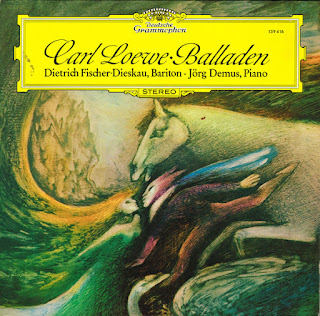As I continue my exploration of ghost songs I have been racking my brain trying to think of the title of this one ballad by Carl Loewe.
I had it on a record when I was a teenager and I remembered everything about it but the title! It was about a princess whose servant fell in love with her, and she dies, and he goes to where she is lying in her coffin. And he pulls her out and embraces her, and she comes to life -- but then things go terribly wrong and they are buried together alive.
Who in the world would think up a song like that?
Of course it had great appeal to me. I even illustrated it. I still have the drawing somewhere. It is stuck in this one notebook. I will have to find it and post it. My illustration showed the servant lifting the princess out of her coffin. I was very happy with how it came out and when I listened to the song, which I did frequently, I would look at it.
I am telling you, inside of every teenage girl is a Mary Shelley struggling to come out. I sure did love the macabre! Still do on occasion.
With which, I still have that record, but I have not been able to see my way clear to go looking for it. I couldn't remember even what the album looked like. The singer was Dietrich Fischer-Dieskau, naturally, but I couldn't remember the pianist.
Turns out it was Jorg Demus on piano. And that is the album up above. I recognized it as soon as I saw it online. I got that album on sale somewhere. I had never heard of Carl Loewe, but I loved Dietrich Fischer-Dieskau and could not resist a bargain where he was concerned. And I liked Lieder.
And let me tell you, this record was a winner. I have not listened to this album for what, 30 years? But I remember "Die Uhr." And "Prinz Eugen." And Loewe's "Erl King" which is pretty cool, even next to Schubert's. And "Edward."
"Edward"!! That is another song for another day. We have to get to that one.
"Dein Schwert, wie ist von Blut so rot, Edward, Edward?"
I still remember that entire crazy song!! And I haven't thought about it for years!
But back to the song about the coffin. I see now it is "Der Gruft der Liebenden." That must mean "The Grave of the Lovers"? I never remember noticing the title.
Oh my goodness!
Here it is on YouTube. No comments. I cannot believe that. Am I the only person in the world to recognize this song's greatness?
I am going to settle in and listen to it for the first time since I was 17.
The beginning. It is all coming back to me.
Those dreamy sleepwalking melodies.
Spooky!!
Now I have to go find my drawing.














